Business Law Report: Contract Analysis and Liability Issues
VerifiedAdded on 2021/04/24
|11
|2902
|30
Report
AI Summary
This business law report delves into the core components of contract formation, including offer, acceptance, consideration, intention to create legal relations, certainty, and capacity. It examines a scenario involving a customer, Avinash, who entered into a contract with a local café and the legal implications of a clause printed on a ticket regarding liability for damages. The report discusses the application of Common Law and Australian Consumer Law in determining the café's responsibility. The report also explores the differences between express and implied terms within contracts, providing examples of how they are used and the legal implications of each, such as employment contracts and leasing agreements, and the importance of consumer rights.
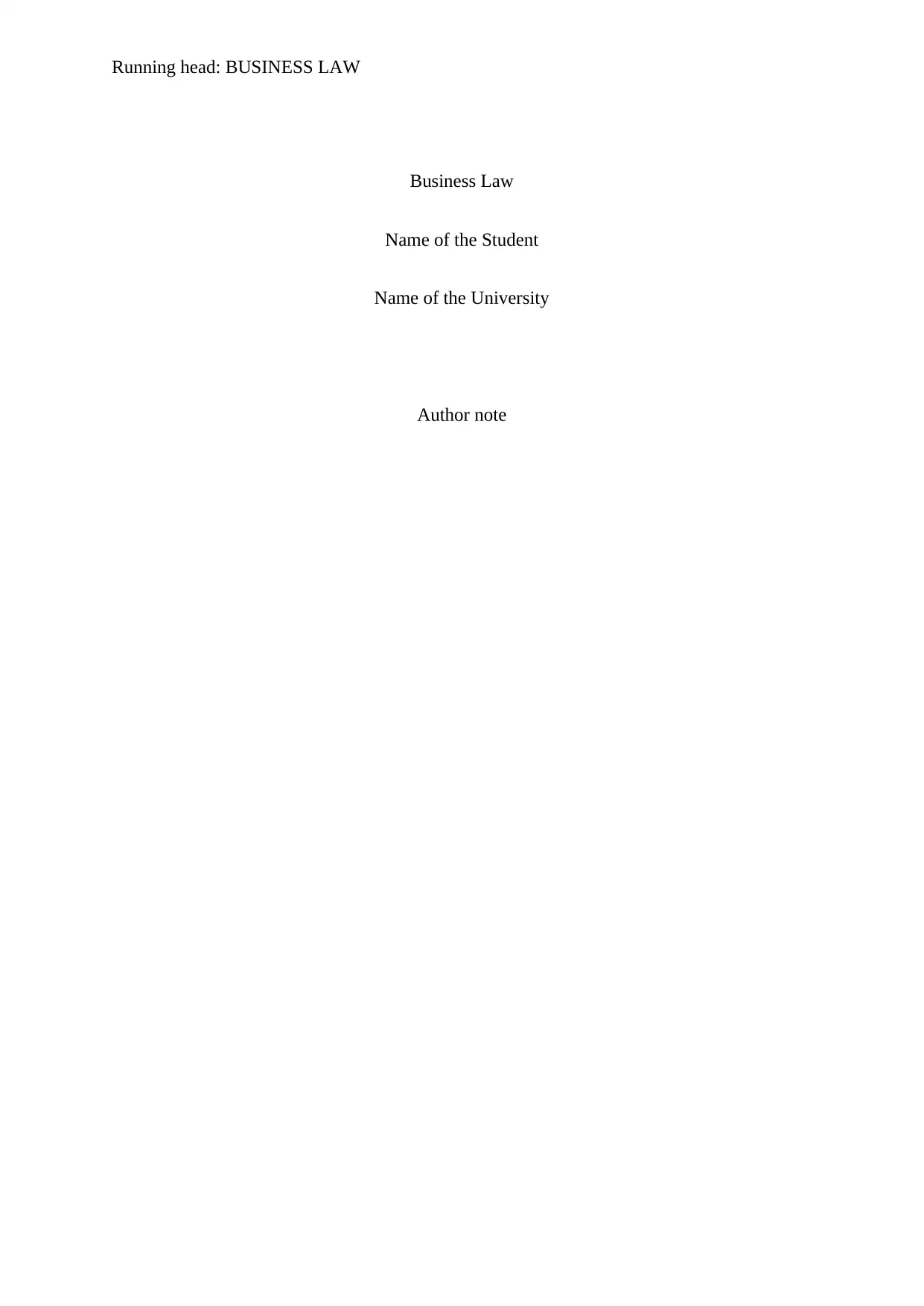
Running head: BUSINESS LAW
Business Law
Name of the Student
Name of the University
Author note
Business Law
Name of the Student
Name of the University
Author note
Paraphrase This Document
Need a fresh take? Get an instant paraphrase of this document with our AI Paraphraser
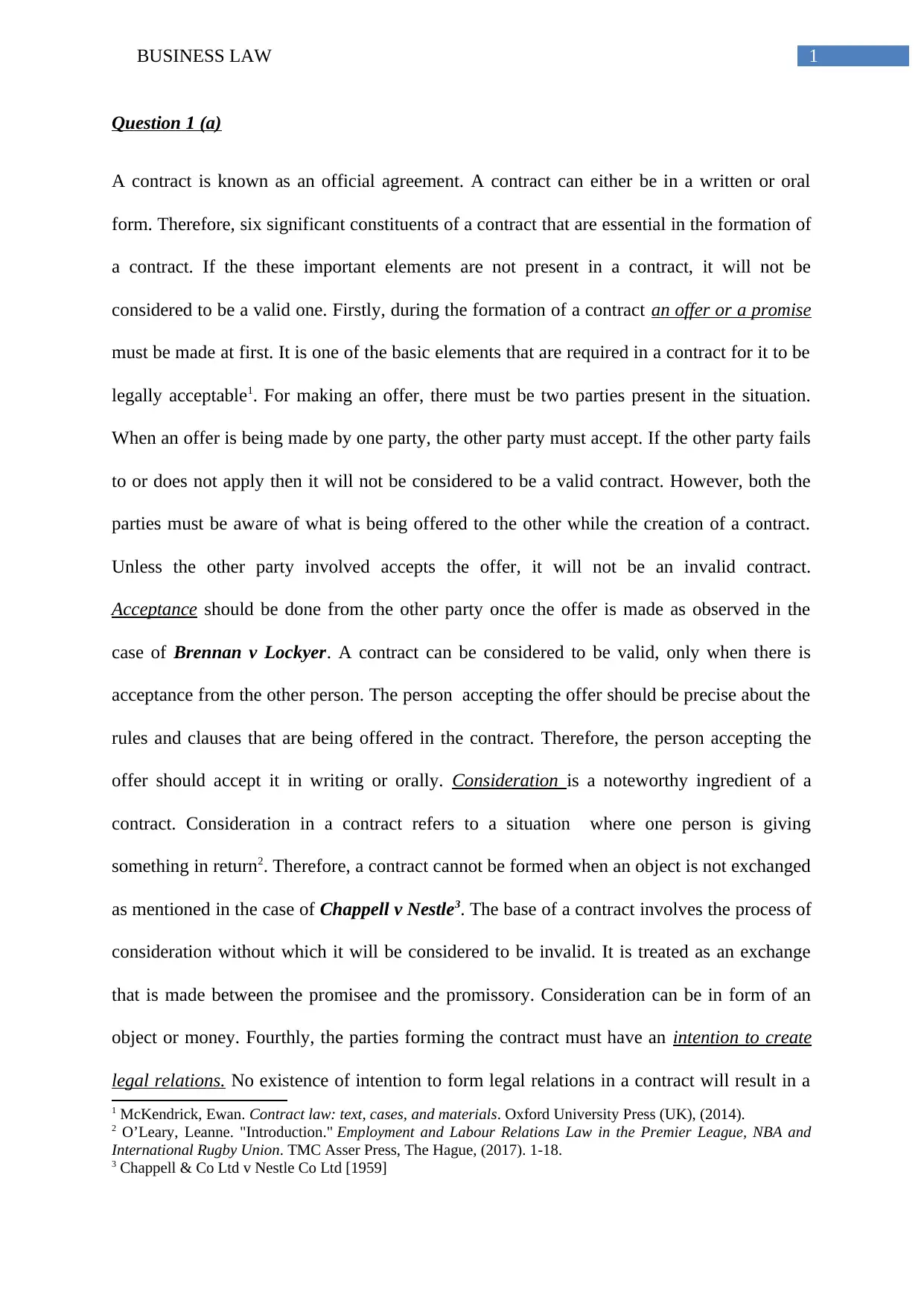
1BUSINESS LAW
Question 1 (a)
A contract is known as an official agreement. A contract can either be in a written or oral
form. Therefore, six significant constituents of a contract that are essential in the formation of
a contract. If the these important elements are not present in a contract, it will not be
considered to be a valid one. Firstly, during the formation of a contract an offer or a promise
must be made at first. It is one of the basic elements that are required in a contract for it to be
legally acceptable1. For making an offer, there must be two parties present in the situation.
When an offer is being made by one party, the other party must accept. If the other party fails
to or does not apply then it will not be considered to be a valid contract. However, both the
parties must be aware of what is being offered to the other while the creation of a contract.
Unless the other party involved accepts the offer, it will not be an invalid contract.
Acceptance should be done from the other party once the offer is made as observed in the
case of Brennan v Lockyer. A contract can be considered to be valid, only when there is
acceptance from the other person. The person accepting the offer should be precise about the
rules and clauses that are being offered in the contract. Therefore, the person accepting the
offer should accept it in writing or orally. Consideration is a noteworthy ingredient of a
contract. Consideration in a contract refers to a situation where one person is giving
something in return2. Therefore, a contract cannot be formed when an object is not exchanged
as mentioned in the case of Chappell v Nestle3. The base of a contract involves the process of
consideration without which it will be considered to be invalid. It is treated as an exchange
that is made between the promisee and the promissory. Consideration can be in form of an
object or money. Fourthly, the parties forming the contract must have an intention to create
legal relations. No existence of intention to form legal relations in a contract will result in a
1 McKendrick, Ewan. Contract law: text, cases, and materials. Oxford University Press (UK), (2014).
2 O’Leary, Leanne. "Introduction." Employment and Labour Relations Law in the Premier League, NBA and
International Rugby Union. TMC Asser Press, The Hague, (2017). 1-18.
3 Chappell & Co Ltd v Nestle Co Ltd [1959]
Question 1 (a)
A contract is known as an official agreement. A contract can either be in a written or oral
form. Therefore, six significant constituents of a contract that are essential in the formation of
a contract. If the these important elements are not present in a contract, it will not be
considered to be a valid one. Firstly, during the formation of a contract an offer or a promise
must be made at first. It is one of the basic elements that are required in a contract for it to be
legally acceptable1. For making an offer, there must be two parties present in the situation.
When an offer is being made by one party, the other party must accept. If the other party fails
to or does not apply then it will not be considered to be a valid contract. However, both the
parties must be aware of what is being offered to the other while the creation of a contract.
Unless the other party involved accepts the offer, it will not be an invalid contract.
Acceptance should be done from the other party once the offer is made as observed in the
case of Brennan v Lockyer. A contract can be considered to be valid, only when there is
acceptance from the other person. The person accepting the offer should be precise about the
rules and clauses that are being offered in the contract. Therefore, the person accepting the
offer should accept it in writing or orally. Consideration is a noteworthy ingredient of a
contract. Consideration in a contract refers to a situation where one person is giving
something in return2. Therefore, a contract cannot be formed when an object is not exchanged
as mentioned in the case of Chappell v Nestle3. The base of a contract involves the process of
consideration without which it will be considered to be invalid. It is treated as an exchange
that is made between the promisee and the promissory. Consideration can be in form of an
object or money. Fourthly, the parties forming the contract must have an intention to create
legal relations. No existence of intention to form legal relations in a contract will result in a
1 McKendrick, Ewan. Contract law: text, cases, and materials. Oxford University Press (UK), (2014).
2 O’Leary, Leanne. "Introduction." Employment and Labour Relations Law in the Premier League, NBA and
International Rugby Union. TMC Asser Press, The Hague, (2017). 1-18.
3 Chappell & Co Ltd v Nestle Co Ltd [1959]
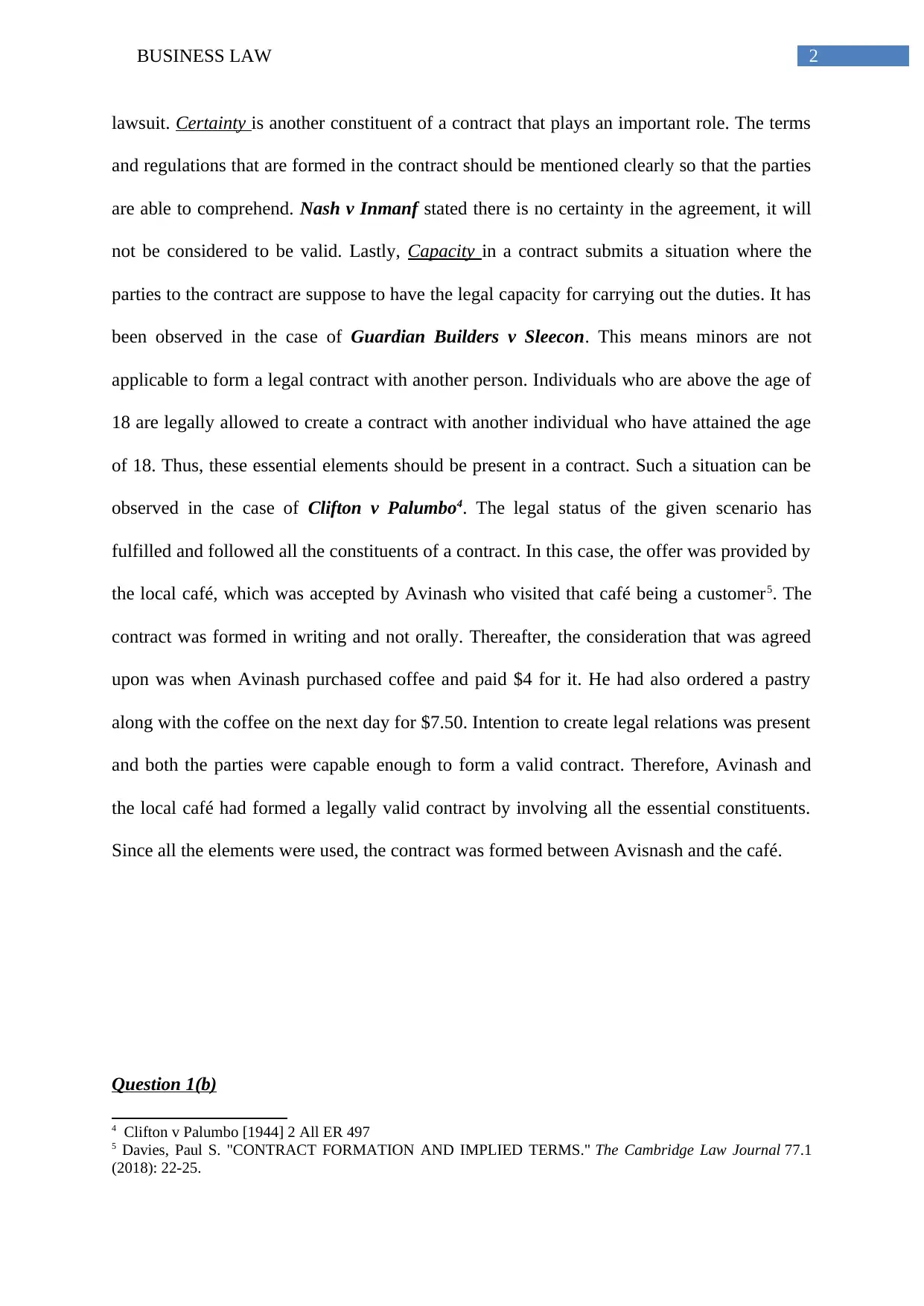
2BUSINESS LAW
lawsuit. Certainty is another constituent of a contract that plays an important role. The terms
and regulations that are formed in the contract should be mentioned clearly so that the parties
are able to comprehend. Nash v Inmanf stated there is no certainty in the agreement, it will
not be considered to be valid. Lastly, Capacity in a contract submits a situation where the
parties to the contract are suppose to have the legal capacity for carrying out the duties. It has
been observed in the case of Guardian Builders v Sleecon. This means minors are not
applicable to form a legal contract with another person. Individuals who are above the age of
18 are legally allowed to create a contract with another individual who have attained the age
of 18. Thus, these essential elements should be present in a contract. Such a situation can be
observed in the case of Clifton v Palumbo4. The legal status of the given scenario has
fulfilled and followed all the constituents of a contract. In this case, the offer was provided by
the local café, which was accepted by Avinash who visited that café being a customer5. The
contract was formed in writing and not orally. Thereafter, the consideration that was agreed
upon was when Avinash purchased coffee and paid $4 for it. He had also ordered a pastry
along with the coffee on the next day for $7.50. Intention to create legal relations was present
and both the parties were capable enough to form a valid contract. Therefore, Avinash and
the local café had formed a legally valid contract by involving all the essential constituents.
Since all the elements were used, the contract was formed between Avisnash and the café.
Question 1(b)
4 Clifton v Palumbo [1944] 2 All ER 497
5 Davies, Paul S. "CONTRACT FORMATION AND IMPLIED TERMS." The Cambridge Law Journal 77.1
(2018): 22-25.
lawsuit. Certainty is another constituent of a contract that plays an important role. The terms
and regulations that are formed in the contract should be mentioned clearly so that the parties
are able to comprehend. Nash v Inmanf stated there is no certainty in the agreement, it will
not be considered to be valid. Lastly, Capacity in a contract submits a situation where the
parties to the contract are suppose to have the legal capacity for carrying out the duties. It has
been observed in the case of Guardian Builders v Sleecon. This means minors are not
applicable to form a legal contract with another person. Individuals who are above the age of
18 are legally allowed to create a contract with another individual who have attained the age
of 18. Thus, these essential elements should be present in a contract. Such a situation can be
observed in the case of Clifton v Palumbo4. The legal status of the given scenario has
fulfilled and followed all the constituents of a contract. In this case, the offer was provided by
the local café, which was accepted by Avinash who visited that café being a customer5. The
contract was formed in writing and not orally. Thereafter, the consideration that was agreed
upon was when Avinash purchased coffee and paid $4 for it. He had also ordered a pastry
along with the coffee on the next day for $7.50. Intention to create legal relations was present
and both the parties were capable enough to form a valid contract. Therefore, Avinash and
the local café had formed a legally valid contract by involving all the essential constituents.
Since all the elements were used, the contract was formed between Avisnash and the café.
Question 1(b)
4 Clifton v Palumbo [1944] 2 All ER 497
5 Davies, Paul S. "CONTRACT FORMATION AND IMPLIED TERMS." The Cambridge Law Journal 77.1
(2018): 22-25.
⊘ This is a preview!⊘
Do you want full access?
Subscribe today to unlock all pages.

Trusted by 1+ million students worldwide
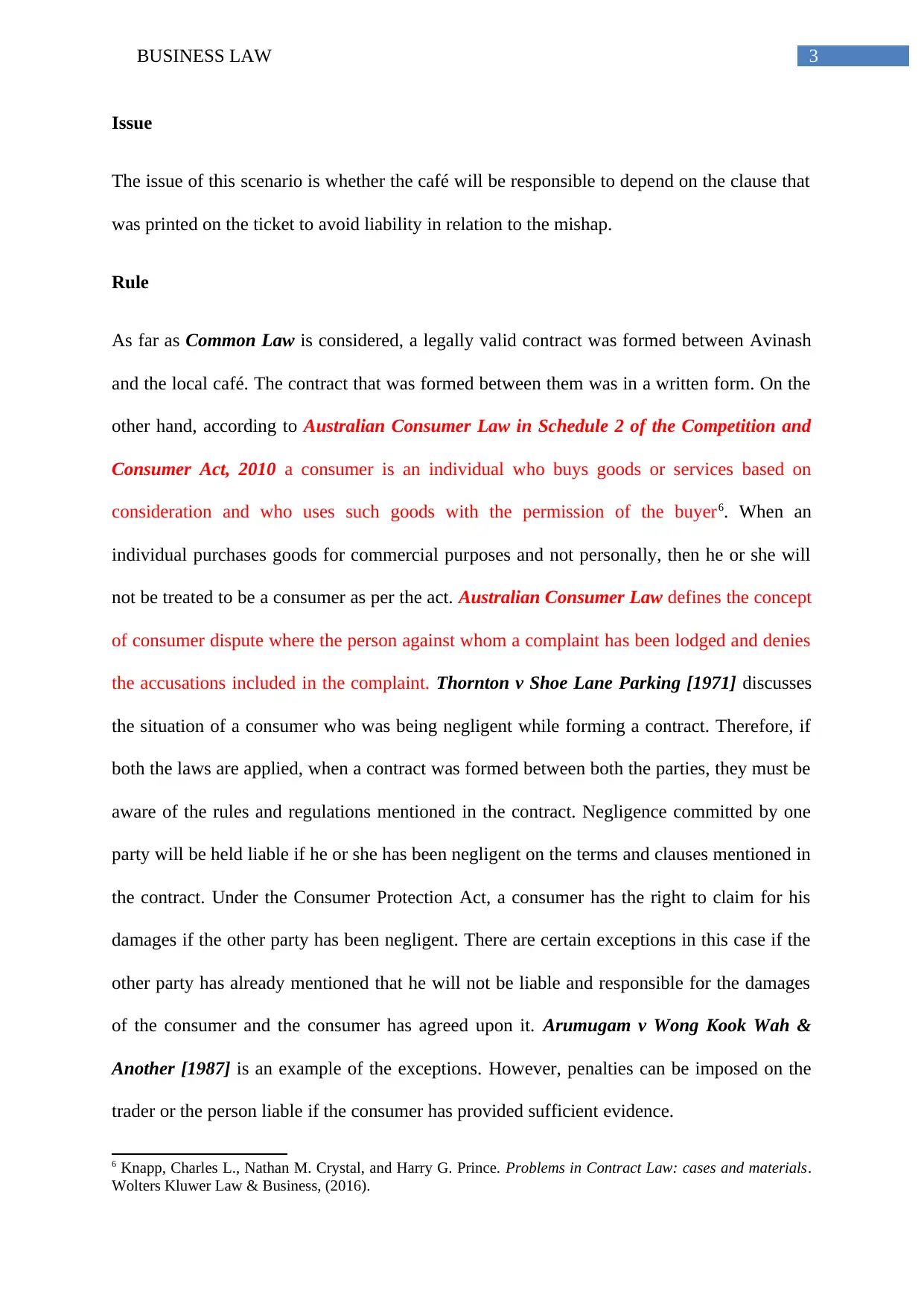
3BUSINESS LAW
Issue
The issue of this scenario is whether the café will be responsible to depend on the clause that
was printed on the ticket to avoid liability in relation to the mishap.
Rule
As far as Common Law is considered, a legally valid contract was formed between Avinash
and the local café. The contract that was formed between them was in a written form. On the
other hand, according to Australian Consumer Law in Schedule 2 of the Competition and
Consumer Act, 2010 a consumer is an individual who buys goods or services based on
consideration and who uses such goods with the permission of the buyer6. When an
individual purchases goods for commercial purposes and not personally, then he or she will
not be treated to be a consumer as per the act. Australian Consumer Law defines the concept
of consumer dispute where the person against whom a complaint has been lodged and denies
the accusations included in the complaint. Thornton v Shoe Lane Parking [1971] discusses
the situation of a consumer who was being negligent while forming a contract. Therefore, if
both the laws are applied, when a contract was formed between both the parties, they must be
aware of the rules and regulations mentioned in the contract. Negligence committed by one
party will be held liable if he or she has been negligent on the terms and clauses mentioned in
the contract. Under the Consumer Protection Act, a consumer has the right to claim for his
damages if the other party has been negligent. There are certain exceptions in this case if the
other party has already mentioned that he will not be liable and responsible for the damages
of the consumer and the consumer has agreed upon it. Arumugam v Wong Kook Wah &
Another [1987] is an example of the exceptions. However, penalties can be imposed on the
trader or the person liable if the consumer has provided sufficient evidence.
6 Knapp, Charles L., Nathan M. Crystal, and Harry G. Prince. Problems in Contract Law: cases and materials.
Wolters Kluwer Law & Business, (2016).
Issue
The issue of this scenario is whether the café will be responsible to depend on the clause that
was printed on the ticket to avoid liability in relation to the mishap.
Rule
As far as Common Law is considered, a legally valid contract was formed between Avinash
and the local café. The contract that was formed between them was in a written form. On the
other hand, according to Australian Consumer Law in Schedule 2 of the Competition and
Consumer Act, 2010 a consumer is an individual who buys goods or services based on
consideration and who uses such goods with the permission of the buyer6. When an
individual purchases goods for commercial purposes and not personally, then he or she will
not be treated to be a consumer as per the act. Australian Consumer Law defines the concept
of consumer dispute where the person against whom a complaint has been lodged and denies
the accusations included in the complaint. Thornton v Shoe Lane Parking [1971] discusses
the situation of a consumer who was being negligent while forming a contract. Therefore, if
both the laws are applied, when a contract was formed between both the parties, they must be
aware of the rules and regulations mentioned in the contract. Negligence committed by one
party will be held liable if he or she has been negligent on the terms and clauses mentioned in
the contract. Under the Consumer Protection Act, a consumer has the right to claim for his
damages if the other party has been negligent. There are certain exceptions in this case if the
other party has already mentioned that he will not be liable and responsible for the damages
of the consumer and the consumer has agreed upon it. Arumugam v Wong Kook Wah &
Another [1987] is an example of the exceptions. However, penalties can be imposed on the
trader or the person liable if the consumer has provided sufficient evidence.
6 Knapp, Charles L., Nathan M. Crystal, and Harry G. Prince. Problems in Contract Law: cases and materials.
Wolters Kluwer Law & Business, (2016).
Paraphrase This Document
Need a fresh take? Get an instant paraphrase of this document with our AI Paraphraser
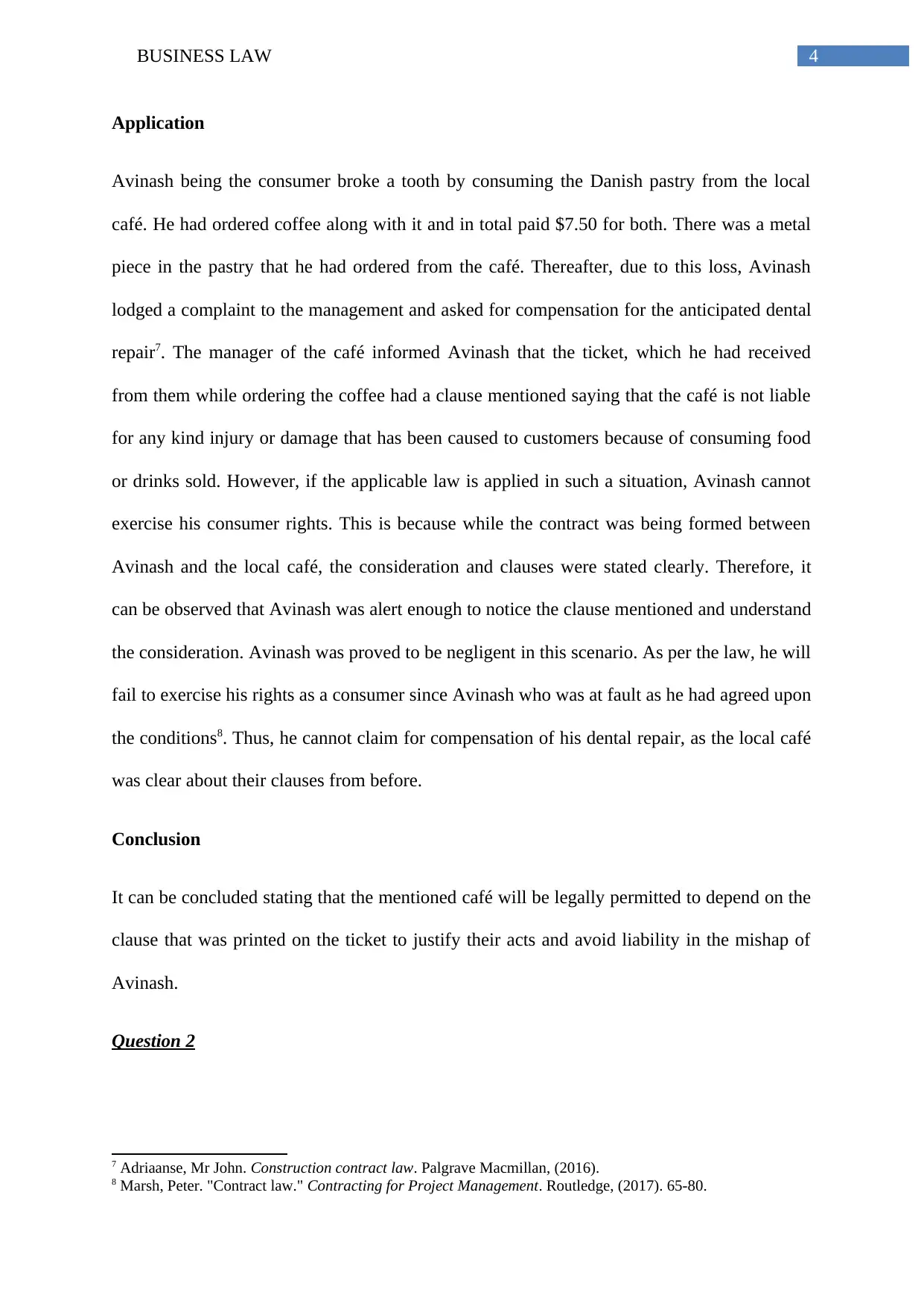
4BUSINESS LAW
Application
Avinash being the consumer broke a tooth by consuming the Danish pastry from the local
café. He had ordered coffee along with it and in total paid $7.50 for both. There was a metal
piece in the pastry that he had ordered from the café. Thereafter, due to this loss, Avinash
lodged a complaint to the management and asked for compensation for the anticipated dental
repair7. The manager of the café informed Avinash that the ticket, which he had received
from them while ordering the coffee had a clause mentioned saying that the café is not liable
for any kind injury or damage that has been caused to customers because of consuming food
or drinks sold. However, if the applicable law is applied in such a situation, Avinash cannot
exercise his consumer rights. This is because while the contract was being formed between
Avinash and the local café, the consideration and clauses were stated clearly. Therefore, it
can be observed that Avinash was alert enough to notice the clause mentioned and understand
the consideration. Avinash was proved to be negligent in this scenario. As per the law, he will
fail to exercise his rights as a consumer since Avinash who was at fault as he had agreed upon
the conditions8. Thus, he cannot claim for compensation of his dental repair, as the local café
was clear about their clauses from before.
Conclusion
It can be concluded stating that the mentioned café will be legally permitted to depend on the
clause that was printed on the ticket to justify their acts and avoid liability in the mishap of
Avinash.
Question 2
7 Adriaanse, Mr John. Construction contract law. Palgrave Macmillan, (2016).
8 Marsh, Peter. "Contract law." Contracting for Project Management. Routledge, (2017). 65-80.
Application
Avinash being the consumer broke a tooth by consuming the Danish pastry from the local
café. He had ordered coffee along with it and in total paid $7.50 for both. There was a metal
piece in the pastry that he had ordered from the café. Thereafter, due to this loss, Avinash
lodged a complaint to the management and asked for compensation for the anticipated dental
repair7. The manager of the café informed Avinash that the ticket, which he had received
from them while ordering the coffee had a clause mentioned saying that the café is not liable
for any kind injury or damage that has been caused to customers because of consuming food
or drinks sold. However, if the applicable law is applied in such a situation, Avinash cannot
exercise his consumer rights. This is because while the contract was being formed between
Avinash and the local café, the consideration and clauses were stated clearly. Therefore, it
can be observed that Avinash was alert enough to notice the clause mentioned and understand
the consideration. Avinash was proved to be negligent in this scenario. As per the law, he will
fail to exercise his rights as a consumer since Avinash who was at fault as he had agreed upon
the conditions8. Thus, he cannot claim for compensation of his dental repair, as the local café
was clear about their clauses from before.
Conclusion
It can be concluded stating that the mentioned café will be legally permitted to depend on the
clause that was printed on the ticket to justify their acts and avoid liability in the mishap of
Avinash.
Question 2
7 Adriaanse, Mr John. Construction contract law. Palgrave Macmillan, (2016).
8 Marsh, Peter. "Contract law." Contracting for Project Management. Routledge, (2017). 65-80.
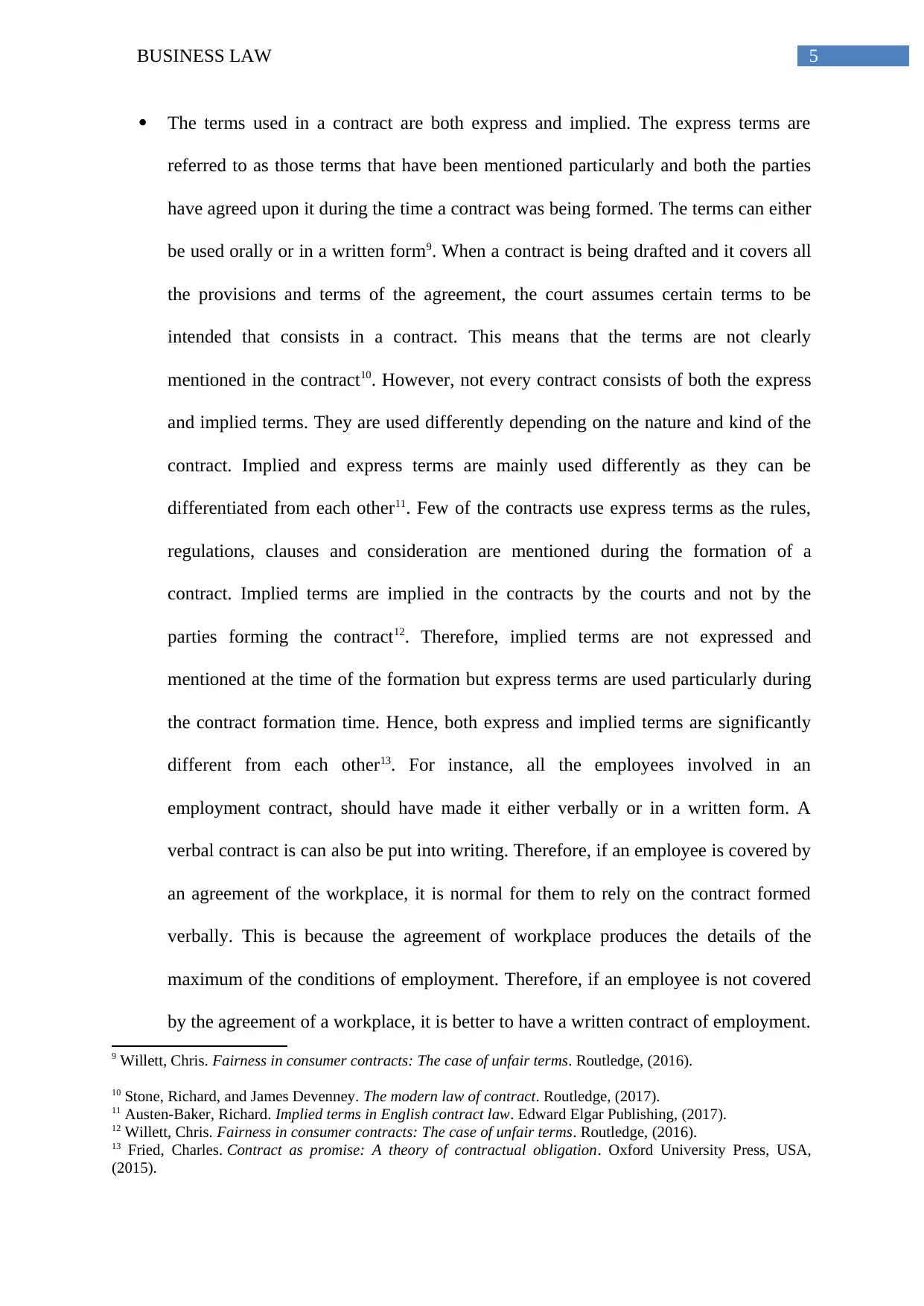
5BUSINESS LAW
The terms used in a contract are both express and implied. The express terms are
referred to as those terms that have been mentioned particularly and both the parties
have agreed upon it during the time a contract was being formed. The terms can either
be used orally or in a written form9. When a contract is being drafted and it covers all
the provisions and terms of the agreement, the court assumes certain terms to be
intended that consists in a contract. This means that the terms are not clearly
mentioned in the contract10. However, not every contract consists of both the express
and implied terms. They are used differently depending on the nature and kind of the
contract. Implied and express terms are mainly used differently as they can be
differentiated from each other11. Few of the contracts use express terms as the rules,
regulations, clauses and consideration are mentioned during the formation of a
contract. Implied terms are implied in the contracts by the courts and not by the
parties forming the contract12. Therefore, implied terms are not expressed and
mentioned at the time of the formation but express terms are used particularly during
the contract formation time. Hence, both express and implied terms are significantly
different from each other13. For instance, all the employees involved in an
employment contract, should have made it either verbally or in a written form. A
verbal contract is can also be put into writing. Therefore, if an employee is covered by
an agreement of the workplace, it is normal for them to rely on the contract formed
verbally. This is because the agreement of workplace produces the details of the
maximum of the conditions of employment. Therefore, if an employee is not covered
by the agreement of a workplace, it is better to have a written contract of employment.
9 Willett, Chris. Fairness in consumer contracts: The case of unfair terms. Routledge, (2016).
10 Stone, Richard, and James Devenney. The modern law of contract. Routledge, (2017).
11 Austen-Baker, Richard. Implied terms in English contract law. Edward Elgar Publishing, (2017).
12 Willett, Chris. Fairness in consumer contracts: The case of unfair terms. Routledge, (2016).
13 Fried, Charles. Contract as promise: A theory of contractual obligation. Oxford University Press, USA,
(2015).
The terms used in a contract are both express and implied. The express terms are
referred to as those terms that have been mentioned particularly and both the parties
have agreed upon it during the time a contract was being formed. The terms can either
be used orally or in a written form9. When a contract is being drafted and it covers all
the provisions and terms of the agreement, the court assumes certain terms to be
intended that consists in a contract. This means that the terms are not clearly
mentioned in the contract10. However, not every contract consists of both the express
and implied terms. They are used differently depending on the nature and kind of the
contract. Implied and express terms are mainly used differently as they can be
differentiated from each other11. Few of the contracts use express terms as the rules,
regulations, clauses and consideration are mentioned during the formation of a
contract. Implied terms are implied in the contracts by the courts and not by the
parties forming the contract12. Therefore, implied terms are not expressed and
mentioned at the time of the formation but express terms are used particularly during
the contract formation time. Hence, both express and implied terms are significantly
different from each other13. For instance, all the employees involved in an
employment contract, should have made it either verbally or in a written form. A
verbal contract is can also be put into writing. Therefore, if an employee is covered by
an agreement of the workplace, it is normal for them to rely on the contract formed
verbally. This is because the agreement of workplace produces the details of the
maximum of the conditions of employment. Therefore, if an employee is not covered
by the agreement of a workplace, it is better to have a written contract of employment.
9 Willett, Chris. Fairness in consumer contracts: The case of unfair terms. Routledge, (2016).
10 Stone, Richard, and James Devenney. The modern law of contract. Routledge, (2017).
11 Austen-Baker, Richard. Implied terms in English contract law. Edward Elgar Publishing, (2017).
12 Willett, Chris. Fairness in consumer contracts: The case of unfair terms. Routledge, (2016).
13 Fried, Charles. Contract as promise: A theory of contractual obligation. Oxford University Press, USA,
(2015).
⊘ This is a preview!⊘
Do you want full access?
Subscribe today to unlock all pages.

Trusted by 1+ million students worldwide
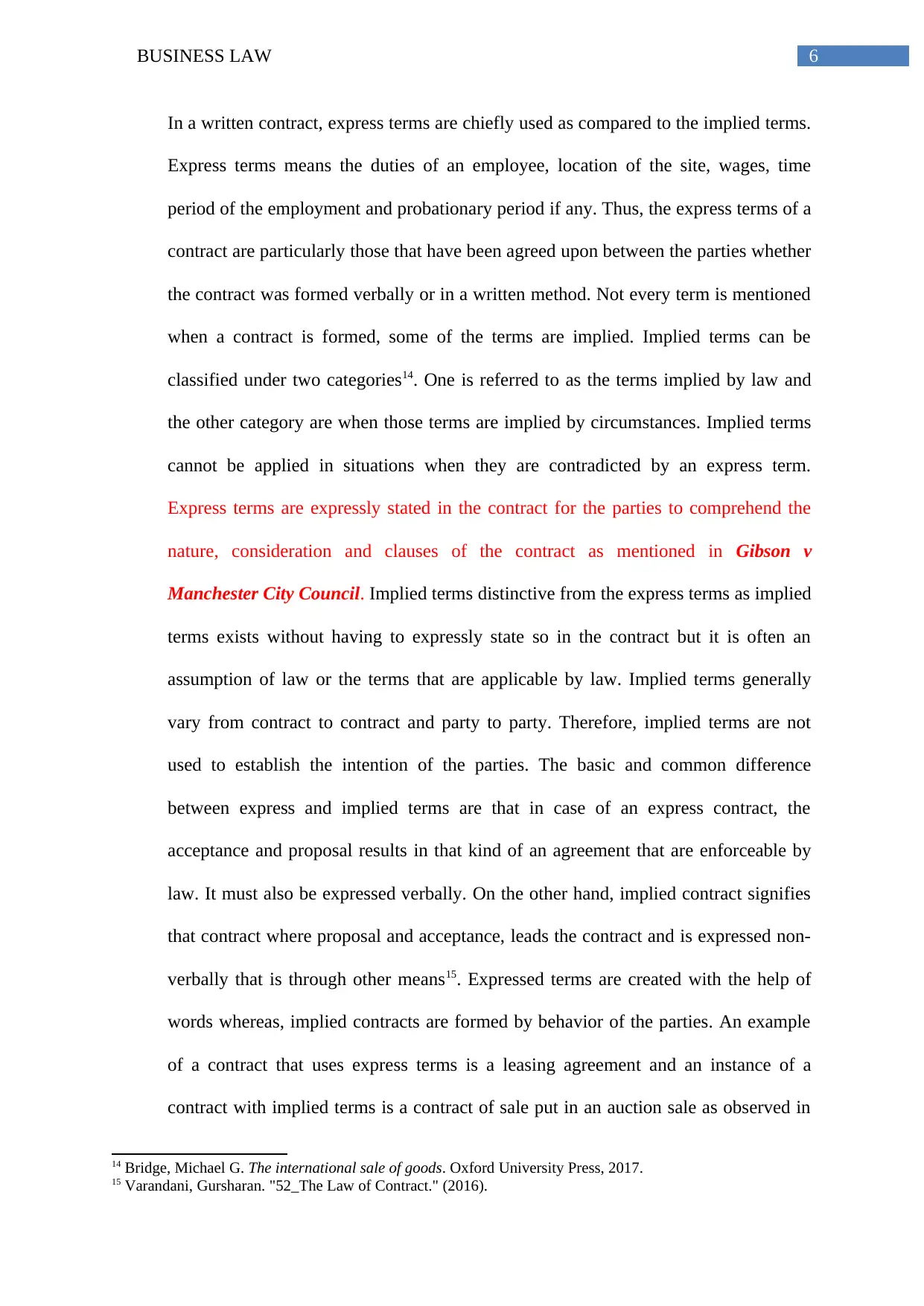
6BUSINESS LAW
In a written contract, express terms are chiefly used as compared to the implied terms.
Express terms means the duties of an employee, location of the site, wages, time
period of the employment and probationary period if any. Thus, the express terms of a
contract are particularly those that have been agreed upon between the parties whether
the contract was formed verbally or in a written method. Not every term is mentioned
when a contract is formed, some of the terms are implied. Implied terms can be
classified under two categories14. One is referred to as the terms implied by law and
the other category are when those terms are implied by circumstances. Implied terms
cannot be applied in situations when they are contradicted by an express term.
Express terms are expressly stated in the contract for the parties to comprehend the
nature, consideration and clauses of the contract as mentioned in Gibson v
Manchester City Council. Implied terms distinctive from the express terms as implied
terms exists without having to expressly state so in the contract but it is often an
assumption of law or the terms that are applicable by law. Implied terms generally
vary from contract to contract and party to party. Therefore, implied terms are not
used to establish the intention of the parties. The basic and common difference
between express and implied terms are that in case of an express contract, the
acceptance and proposal results in that kind of an agreement that are enforceable by
law. It must also be expressed verbally. On the other hand, implied contract signifies
that contract where proposal and acceptance, leads the contract and is expressed non-
verbally that is through other means15. Expressed terms are created with the help of
words whereas, implied contracts are formed by behavior of the parties. An example
of a contract that uses express terms is a leasing agreement and an instance of a
contract with implied terms is a contract of sale put in an auction sale as observed in
14 Bridge, Michael G. The international sale of goods. Oxford University Press, 2017.
15 Varandani, Gursharan. "52_The Law of Contract." (2016).
In a written contract, express terms are chiefly used as compared to the implied terms.
Express terms means the duties of an employee, location of the site, wages, time
period of the employment and probationary period if any. Thus, the express terms of a
contract are particularly those that have been agreed upon between the parties whether
the contract was formed verbally or in a written method. Not every term is mentioned
when a contract is formed, some of the terms are implied. Implied terms can be
classified under two categories14. One is referred to as the terms implied by law and
the other category are when those terms are implied by circumstances. Implied terms
cannot be applied in situations when they are contradicted by an express term.
Express terms are expressly stated in the contract for the parties to comprehend the
nature, consideration and clauses of the contract as mentioned in Gibson v
Manchester City Council. Implied terms distinctive from the express terms as implied
terms exists without having to expressly state so in the contract but it is often an
assumption of law or the terms that are applicable by law. Implied terms generally
vary from contract to contract and party to party. Therefore, implied terms are not
used to establish the intention of the parties. The basic and common difference
between express and implied terms are that in case of an express contract, the
acceptance and proposal results in that kind of an agreement that are enforceable by
law. It must also be expressed verbally. On the other hand, implied contract signifies
that contract where proposal and acceptance, leads the contract and is expressed non-
verbally that is through other means15. Expressed terms are created with the help of
words whereas, implied contracts are formed by behavior of the parties. An example
of a contract that uses express terms is a leasing agreement and an instance of a
contract with implied terms is a contract of sale put in an auction sale as observed in
14 Bridge, Michael G. The international sale of goods. Oxford University Press, 2017.
15 Varandani, Gursharan. "52_The Law of Contract." (2016).
Paraphrase This Document
Need a fresh take? Get an instant paraphrase of this document with our AI Paraphraser
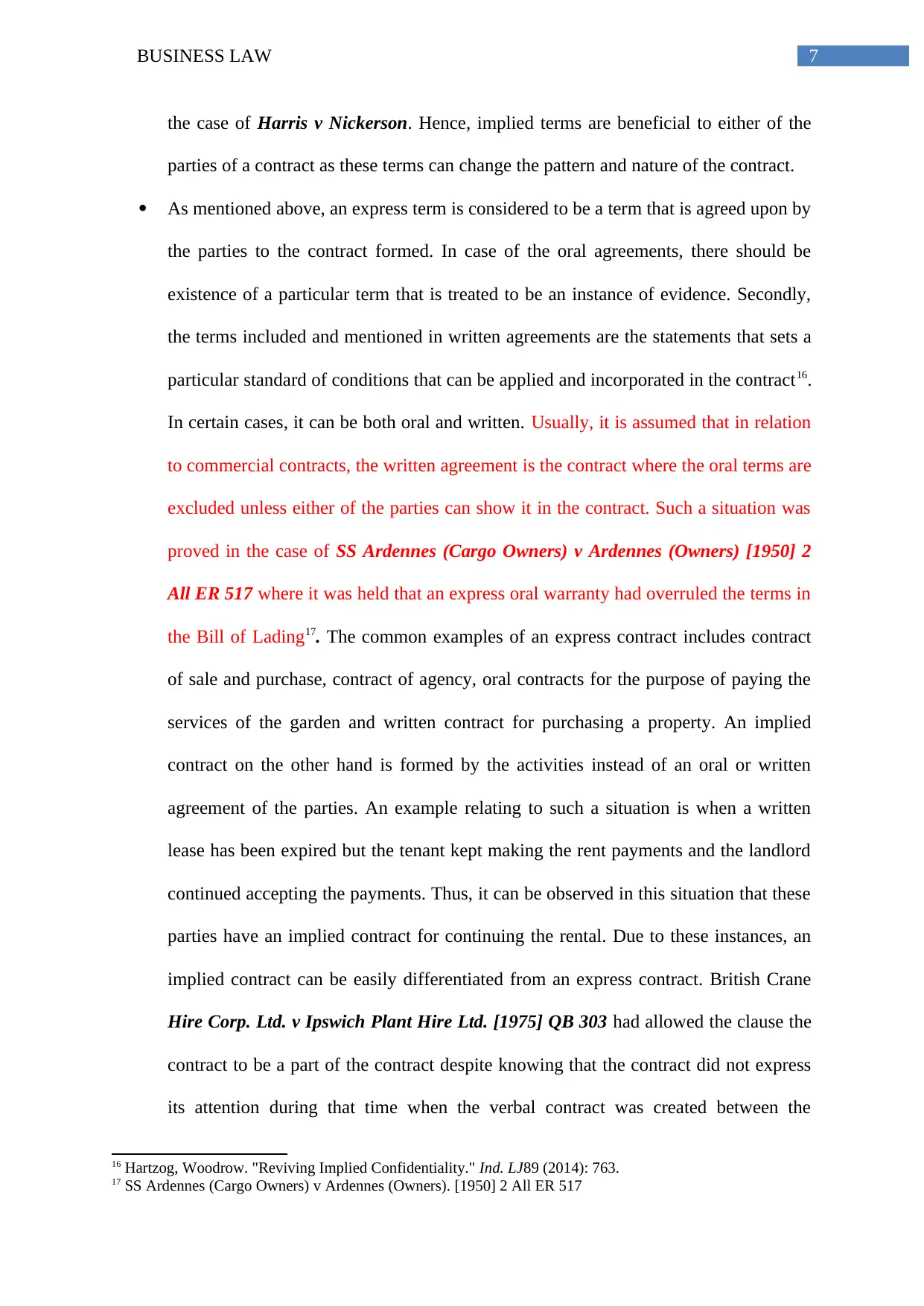
7BUSINESS LAW
the case of Harris v Nickerson. Hence, implied terms are beneficial to either of the
parties of a contract as these terms can change the pattern and nature of the contract.
As mentioned above, an express term is considered to be a term that is agreed upon by
the parties to the contract formed. In case of the oral agreements, there should be
existence of a particular term that is treated to be an instance of evidence. Secondly,
the terms included and mentioned in written agreements are the statements that sets a
particular standard of conditions that can be applied and incorporated in the contract16.
In certain cases, it can be both oral and written. Usually, it is assumed that in relation
to commercial contracts, the written agreement is the contract where the oral terms are
excluded unless either of the parties can show it in the contract. Such a situation was
proved in the case of SS Ardennes (Cargo Owners) v Ardennes (Owners) [1950] 2
All ER 517 where it was held that an express oral warranty had overruled the terms in
the Bill of Lading17. The common examples of an express contract includes contract
of sale and purchase, contract of agency, oral contracts for the purpose of paying the
services of the garden and written contract for purchasing a property. An implied
contract on the other hand is formed by the activities instead of an oral or written
agreement of the parties. An example relating to such a situation is when a written
lease has been expired but the tenant kept making the rent payments and the landlord
continued accepting the payments. Thus, it can be observed in this situation that these
parties have an implied contract for continuing the rental. Due to these instances, an
implied contract can be easily differentiated from an express contract. British Crane
Hire Corp. Ltd. v Ipswich Plant Hire Ltd. [1975] QB 303 had allowed the clause the
contract to be a part of the contract despite knowing that the contract did not express
its attention during that time when the verbal contract was created between the
16 Hartzog, Woodrow. "Reviving Implied Confidentiality." Ind. LJ89 (2014): 763.
17 SS Ardennes (Cargo Owners) v Ardennes (Owners). [1950] 2 All ER 517
the case of Harris v Nickerson. Hence, implied terms are beneficial to either of the
parties of a contract as these terms can change the pattern and nature of the contract.
As mentioned above, an express term is considered to be a term that is agreed upon by
the parties to the contract formed. In case of the oral agreements, there should be
existence of a particular term that is treated to be an instance of evidence. Secondly,
the terms included and mentioned in written agreements are the statements that sets a
particular standard of conditions that can be applied and incorporated in the contract16.
In certain cases, it can be both oral and written. Usually, it is assumed that in relation
to commercial contracts, the written agreement is the contract where the oral terms are
excluded unless either of the parties can show it in the contract. Such a situation was
proved in the case of SS Ardennes (Cargo Owners) v Ardennes (Owners) [1950] 2
All ER 517 where it was held that an express oral warranty had overruled the terms in
the Bill of Lading17. The common examples of an express contract includes contract
of sale and purchase, contract of agency, oral contracts for the purpose of paying the
services of the garden and written contract for purchasing a property. An implied
contract on the other hand is formed by the activities instead of an oral or written
agreement of the parties. An example relating to such a situation is when a written
lease has been expired but the tenant kept making the rent payments and the landlord
continued accepting the payments. Thus, it can be observed in this situation that these
parties have an implied contract for continuing the rental. Due to these instances, an
implied contract can be easily differentiated from an express contract. British Crane
Hire Corp. Ltd. v Ipswich Plant Hire Ltd. [1975] QB 303 had allowed the clause the
contract to be a part of the contract despite knowing that the contract did not express
its attention during that time when the verbal contract was created between the
16 Hartzog, Woodrow. "Reviving Implied Confidentiality." Ind. LJ89 (2014): 763.
17 SS Ardennes (Cargo Owners) v Ardennes (Owners). [1950] 2 All ER 517
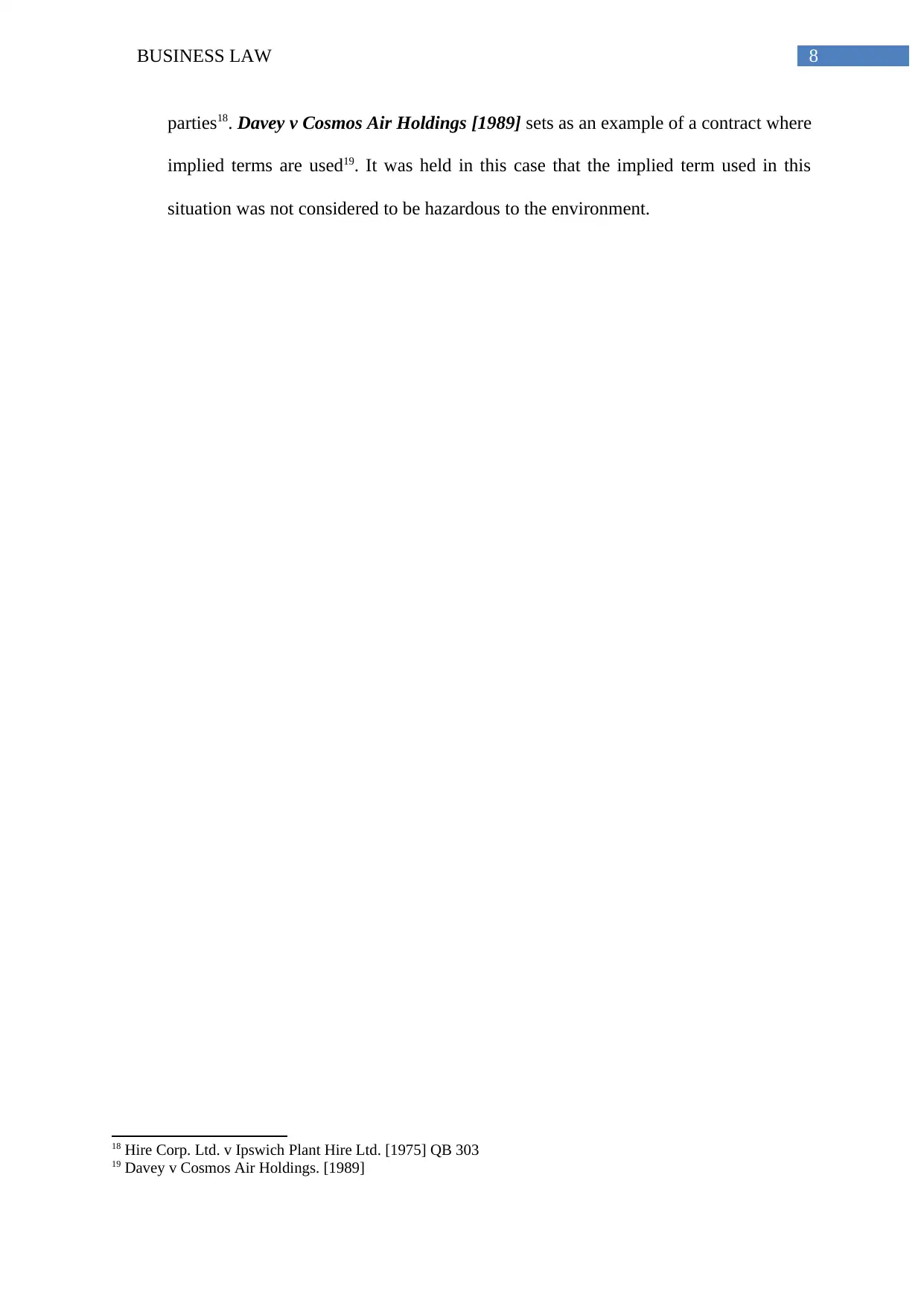
8BUSINESS LAW
parties18. Davey v Cosmos Air Holdings [1989] sets as an example of a contract where
implied terms are used19. It was held in this case that the implied term used in this
situation was not considered to be hazardous to the environment.
18 Hire Corp. Ltd. v Ipswich Plant Hire Ltd. [1975] QB 303
19 Davey v Cosmos Air Holdings. [1989]
parties18. Davey v Cosmos Air Holdings [1989] sets as an example of a contract where
implied terms are used19. It was held in this case that the implied term used in this
situation was not considered to be hazardous to the environment.
18 Hire Corp. Ltd. v Ipswich Plant Hire Ltd. [1975] QB 303
19 Davey v Cosmos Air Holdings. [1989]
⊘ This is a preview!⊘
Do you want full access?
Subscribe today to unlock all pages.

Trusted by 1+ million students worldwide
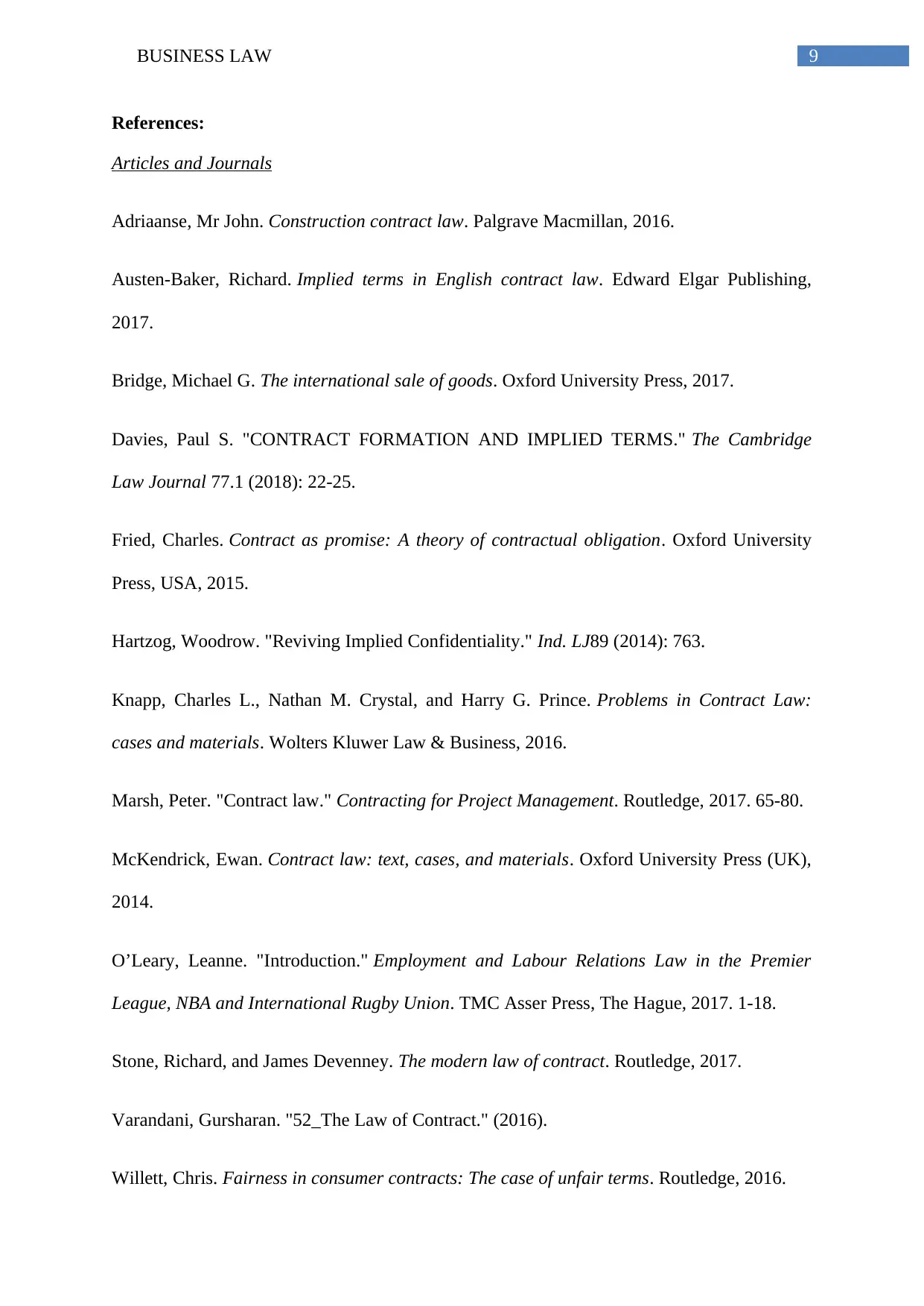
9BUSINESS LAW
References:
Articles and Journals
Adriaanse, Mr John. Construction contract law. Palgrave Macmillan, 2016.
Austen-Baker, Richard. Implied terms in English contract law. Edward Elgar Publishing,
2017.
Bridge, Michael G. The international sale of goods. Oxford University Press, 2017.
Davies, Paul S. "CONTRACT FORMATION AND IMPLIED TERMS." The Cambridge
Law Journal 77.1 (2018): 22-25.
Fried, Charles. Contract as promise: A theory of contractual obligation. Oxford University
Press, USA, 2015.
Hartzog, Woodrow. "Reviving Implied Confidentiality." Ind. LJ89 (2014): 763.
Knapp, Charles L., Nathan M. Crystal, and Harry G. Prince. Problems in Contract Law:
cases and materials. Wolters Kluwer Law & Business, 2016.
Marsh, Peter. "Contract law." Contracting for Project Management. Routledge, 2017. 65-80.
McKendrick, Ewan. Contract law: text, cases, and materials. Oxford University Press (UK),
2014.
O’Leary, Leanne. "Introduction." Employment and Labour Relations Law in the Premier
League, NBA and International Rugby Union. TMC Asser Press, The Hague, 2017. 1-18.
Stone, Richard, and James Devenney. The modern law of contract. Routledge, 2017.
Varandani, Gursharan. "52_The Law of Contract." (2016).
Willett, Chris. Fairness in consumer contracts: The case of unfair terms. Routledge, 2016.
References:
Articles and Journals
Adriaanse, Mr John. Construction contract law. Palgrave Macmillan, 2016.
Austen-Baker, Richard. Implied terms in English contract law. Edward Elgar Publishing,
2017.
Bridge, Michael G. The international sale of goods. Oxford University Press, 2017.
Davies, Paul S. "CONTRACT FORMATION AND IMPLIED TERMS." The Cambridge
Law Journal 77.1 (2018): 22-25.
Fried, Charles. Contract as promise: A theory of contractual obligation. Oxford University
Press, USA, 2015.
Hartzog, Woodrow. "Reviving Implied Confidentiality." Ind. LJ89 (2014): 763.
Knapp, Charles L., Nathan M. Crystal, and Harry G. Prince. Problems in Contract Law:
cases and materials. Wolters Kluwer Law & Business, 2016.
Marsh, Peter. "Contract law." Contracting for Project Management. Routledge, 2017. 65-80.
McKendrick, Ewan. Contract law: text, cases, and materials. Oxford University Press (UK),
2014.
O’Leary, Leanne. "Introduction." Employment and Labour Relations Law in the Premier
League, NBA and International Rugby Union. TMC Asser Press, The Hague, 2017. 1-18.
Stone, Richard, and James Devenney. The modern law of contract. Routledge, 2017.
Varandani, Gursharan. "52_The Law of Contract." (2016).
Willett, Chris. Fairness in consumer contracts: The case of unfair terms. Routledge, 2016.
Paraphrase This Document
Need a fresh take? Get an instant paraphrase of this document with our AI Paraphraser
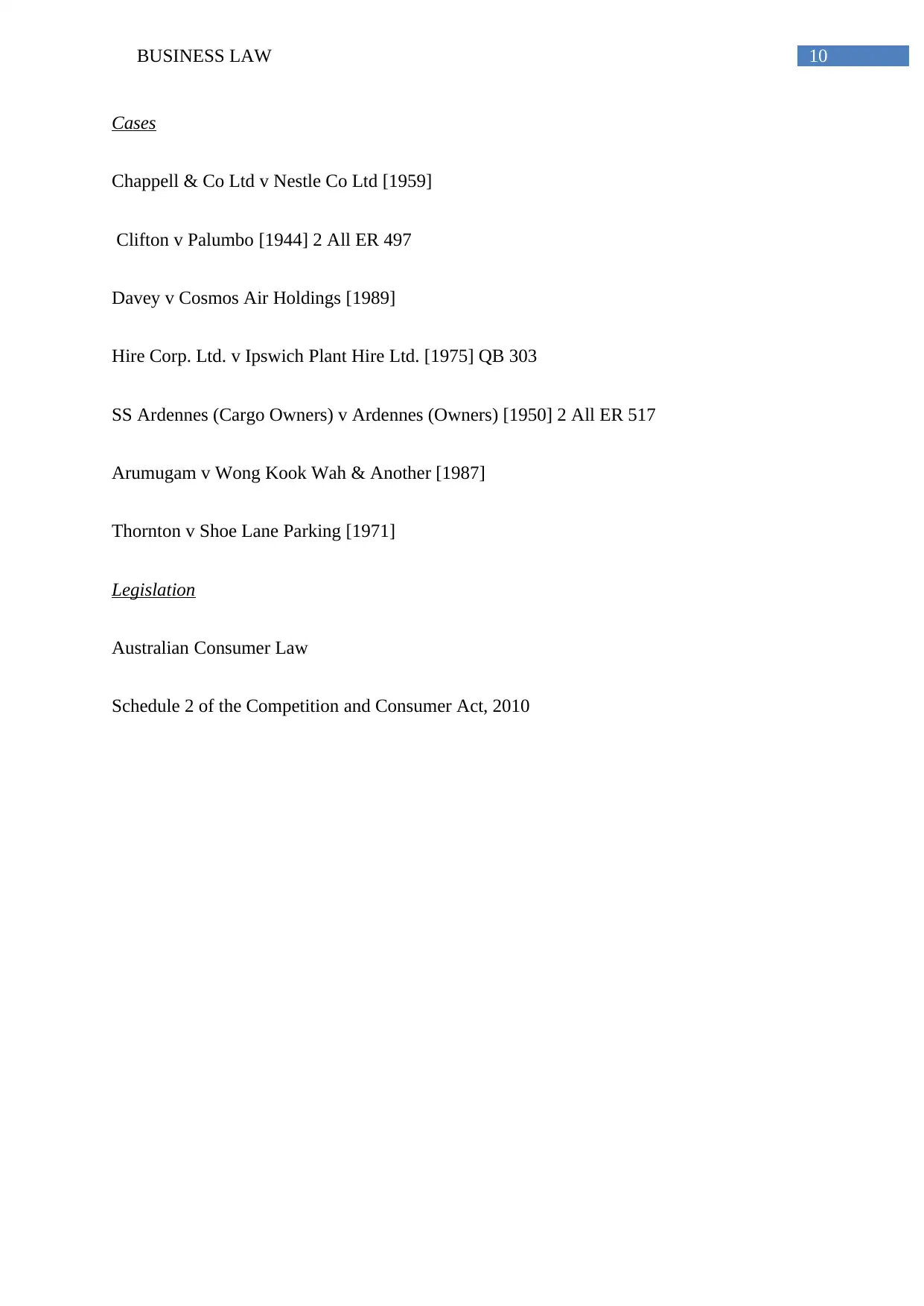
10BUSINESS LAW
Cases
Chappell & Co Ltd v Nestle Co Ltd [1959]
Clifton v Palumbo [1944] 2 All ER 497
Davey v Cosmos Air Holdings [1989]
Hire Corp. Ltd. v Ipswich Plant Hire Ltd. [1975] QB 303
SS Ardennes (Cargo Owners) v Ardennes (Owners) [1950] 2 All ER 517
Arumugam v Wong Kook Wah & Another [1987]
Thornton v Shoe Lane Parking [1971]
Legislation
Australian Consumer Law
Schedule 2 of the Competition and Consumer Act, 2010
Cases
Chappell & Co Ltd v Nestle Co Ltd [1959]
Clifton v Palumbo [1944] 2 All ER 497
Davey v Cosmos Air Holdings [1989]
Hire Corp. Ltd. v Ipswich Plant Hire Ltd. [1975] QB 303
SS Ardennes (Cargo Owners) v Ardennes (Owners) [1950] 2 All ER 517
Arumugam v Wong Kook Wah & Another [1987]
Thornton v Shoe Lane Parking [1971]
Legislation
Australian Consumer Law
Schedule 2 of the Competition and Consumer Act, 2010
1 out of 11
Related Documents
Your All-in-One AI-Powered Toolkit for Academic Success.
+13062052269
info@desklib.com
Available 24*7 on WhatsApp / Email
![[object Object]](/_next/static/media/star-bottom.7253800d.svg)
Unlock your academic potential
Copyright © 2020–2026 A2Z Services. All Rights Reserved. Developed and managed by ZUCOL.





